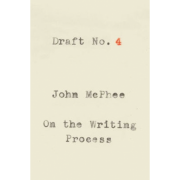Does the end come before the beginning?

 I was intrigued by the following tip in Draft No. 4, a book written by John McPhee, a staff writer for The New Yorker.
I was intrigued by the following tip in Draft No. 4, a book written by John McPhee, a staff writer for The New Yorker.
I settled on an ending before going back to the beginning.
It’s always good to have the ending in mind before you start a draft. That will take you to your destination more efficiently. However, McPhee does some work before he settles on his ending.
What to do when you’re “wallowing” in notes
Earlier in his chapter on “Structure,” he wrote about a time when he was “wallowing” in notes. Rather than plunge into writing, he organized his notes into piles. But he started that process only after generating a lead sentence. On one occasion,
I spent half the night slowly sorting, making little stacks of thematically or chronologically associated notes, and arranging them in an order that seemed to hang well from that lead sentence: “The citizen had certain misgivings.”
That process sounds familiar to me. That’s how I organized my notes from my Ph.D. dissertation. I wrote about that in “Index-card approach to writing.” I wish I could say that I, like McPhee, had my ending in mind before I spread my index cards on my floor. However, aside from chronological order, I didn’t have a good idea of where I was going.
Today I’d use mind mapping, which I discuss in Financial Blogging: How to Write Powerful Posts That Attract Clients to organize my thoughts. When I wrote my financial blogging book, I started with posts written for my blog. I also did a bit of mind mapping to decide on the order of my chapters, though I also tweaked the order based on feedback from my writing group.
Knowing the end makes it easier to edit
When writing something short, like a blog post, it’s much easier to start with the end in mind like McPhee, knowing your destination makes it easier to decide what information to keep. You can prune anything that doesn’t lead to your destination.
The next time you write something, try to figure out its ending before you start writing.
Disclosure: If you click on an Amazon link in this post and then buy something, I will receive a small commission. I link only to books in which I find some value for my blog’s readers.






You may enjoy this even though it’s about science writing, not investment writing…
https://kottke.org/18/04/the-finkbeiner-test
Thank you, Andy!